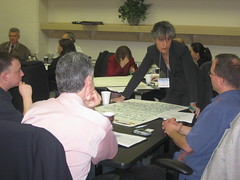How Can You Get a Job With No Experience?
Landing a job in today’s economy certainly is a challenge. There are so many highly qualified and experienced candidates out there that it can be nearly impossible for a recent college graduate or an individual with no job experience to break into the profession they desire.
Recently, job hunters have been bombarded with statistics and statements about the dismal state of the job economy—unemployment was recently at an all-time high, jobs are still scarce, and with graduates willing to accept lower level jobs, college degrees are losing their potency in the professional world.
For any job hunter out there, this can be an exhausting and frightening atmosphere to set foot in. But, this is how landing a job works. You have to put your foot forward and your head on the line. Oftentimes, job hopefuls find themselves in a bit of a conundrum. Employers are looking for candidates with experience, but candidates can’t get that experience until they land the job. While this is no doubt a challenge, there are many ways to display the expertise and skillset required for a job without having the specific job experience. Try these three techniques to help land a job without any relevant experience.
Recognize (and Communicate) Your True Skills
Often, we have skills and expertise with things that we aren’t able to recognize as assets for our resume. This can be one of the most challenging aspects of developing a resume and writing a cover letter. Evaluate your actual skillsets and experience. Even as a student, as a volunteer, or in jobs that are unrelated to the current position that you are applying for there are likely duties that you performed and things that you completed that apply directly to this new position. You want to carefully evaluate your previous academic, professional and even recreational experiences. Focus on small and specific aspects of your previous work that you think can be directly applied to the position you are currently applying to. Even if the two jobs or subjects are nothing alike, they likely share some general duties, skills, or practices. For example, a job applicant with a degree in English applying for a marketing position can explain their writing skills and experience with understanding audiences in literature. And by noting that different perspectives in writing can relate directly to targeting a marketing audience and help in gearing a campaign towards to the right customer base. Or if you organized an event for a club you can highlight the skills you used.
Look at the broader picture of your skills and see how they can be translated into something relevant for a new position.
Get an Internship or Volunteer Somewhere Relevant
Oftentimes, people apply for job after job, desperately trying to find a position that pays. Of course, this is what we all want. However, if you are constantly confronted with the issue of not having enough experience for the positions you are applying for, seeking unpaid experience opportunities may be your best option. Consider volunteering or taking an unpaid internship somewhere that is relevant to the kind of work you would like to do. This is a great way to gain experience in a specific area while continuing to look for a job. Volunteering somewhere that is related to the kind of job that you would like to get looks great to potential employers and allows you the time you need to still job search and go to interviews. Internships can be harder to come by, but are also a wonderful option for gaining work experience. Even if you aren’t getting paid to do the work, that experience on your resume is in many ways as good as a paycheck in the long run. Employers will appreciate your drive and dedication to your industry. Activeness and passion are two huge selling points in potential employees.
Internships can also be a “foot-in-the-door” if you are a hard worker and likeable they may be willing to hire you when your internship is finished. See Internships Can Help
Network, Network, Network
Professional networking has been the name of the game for some time now. We’ve all heard it and we all know that finding and making real professional connections is key to job search success—but, how exactly does one network? Networking takes a bit more effort than merely scrounging your Facebook friend list for people with potential job leads. One of the best places to find and create professional connections is through an internship or volunteer experience. Get connected with your supervisors and leaders. Talk to your fellow interns or volunteers. Some of these people may be the connection you need to land your dream position. A huge part of finding a job in today’s market is utilizing positive word of mouth. Ask your connections to let you know about jobs they hear about. Give them your contact information and resume. Ask them if they can think of any relevant connections they might have that you could get in contact with. All of these things may be the step you need to take to find the right connection to your next job. Networking can be a lot of work, but it almost always pays off. Even after you find a position, your professional network is important to maintain.
Modern social networking tools are a great way to network but facebook is more for social activities. In the professional world, you need a LinkedIn account. This is like an online resume and allows you to start professional networking online. Their New User guide can help you get started.
See Also:
10 Awesome Jobs You Can Do From Home
The Difference a Degree Makes in Unemployment Levels
Author Bio:
This is a guest post by Nadia Jones who blogs at accredited online colleges about education, college, student, teacher, money saving, movie related topics. You can reach her at nadia.jones5 @ gmail.com.

